Destiny: Bungie unveils its shared-world shooter
The 10-year journey begins.
In 2001 Bungie revolutionised console shooters with Halo. Over a decade later it hopes to repeat the trick with Destiny, one of the most ambitious projects ever undertaken by a game developer. But exactly how it will manage to do so remains shrouded in mystery.
Earlier this week press from across the world sat down inside the studio's in-house theatre to see perhaps the most anticipated game in development, but executives failed to pull the curtain back as we'd hoped they would. Developers took to the stage not to show off screenshots and gameplay footage, but to instead show concept art and describe the grand philosophy. As a glimpse at the post-apocalyptic future world the studio has been rehearsing since August 2009, it was as frustrating as it was tantalising - a bit like the first act of the Matrix, during which Morpheus tells Neo in his deep, knowing tone that you can't be told what the Matrix is; you have to see it for yourself. Except right now it's without the next two acts that let us see it for ourselves.
With those two acts set for PR beats later this year, it is easier to explain what Destiny is not, rather than what it is. Activision Publishing boss Eric Hirshberg says it's not an MMO. No, it most definitely is not an MMO. And Activision most definitely will not charge a subscription fee for it. "As we saw Destiny come together," he says, "we realised it belonged to a genre we couldn't quite pin down."
Destiny has elements of a first-person shooter, the Halo-style experience Bungie built its reputation on, elements of an open world sandbox and elements of a persistent world. "We realised to refer to Destiny as any one of these pre-existing genres would almost be to undersell or under-promise what we think it could deliver to gamers, because we think it has the capacity to deliver a new experience," Hirshberg continues.
Over the past few years whispers heard through the Seattle rain described Destiny as "Warcraft in space". After a day spent inside Bungie listening to key developers say as much as they can about Destiny without saying much about it at all, I feel like it's an appropriate way of thinking about the game. But Hirshberg has coined a different phrase. He calls Destiny the "world's first shared-world shooter".
But what, exactly, does that mean? How will it work? How will it play?
As we saw Destiny come together we realised it belonged to a genre we couldn't quite pin down
Activision Publishing boss Eric Hirshberg
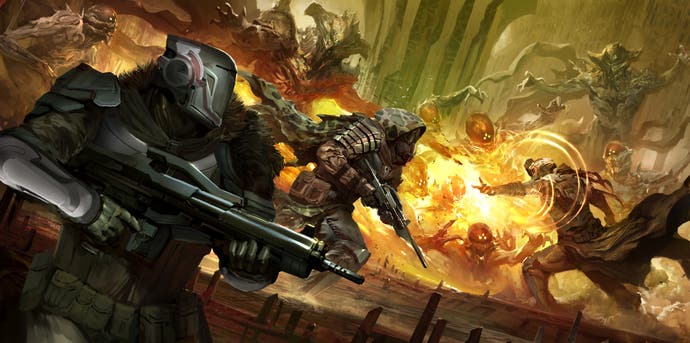
Destiny is a persistent world complete with a dynamic day/night cycle and weather effects. Your character has persistent progression across single-player, co-op and competitive multiplayer as it levels up and gains new equipment and weapons. But the most important feature to note is that players, and Destiny, are always connected to the internet. Indeed you have to be connected for the game to work. Even when you're playing on your own you're playing with other players.
This high level explanation is as detailed as it gets for now. Bungie isn't ready to talk about gameplay systems, weapons, classes, level structure, crafting, gambling or even menus, the latter of which, by the way, have been ditched. It would rather explain why the world it's created is so compelling and so inviting, a sci-fi fantasy universe gamers will be drawn to and desperate to stick with not just for days or weeks or months, but for a decade.
"There's been a lot of rumours that we're working on an MMOFPS, whatever that is, or a social game," Jason Jones, Bungie co-founder and Destiny project director, says. "The truth is, if you enjoy first-person shooters and you play them on console, Destiny's going to be the best one you've ever played. That's our goal.
"We've learned our lessons from MMOs. We've learned our lessons from Facebook games. But Destiny is a console first-person shooter. It's the kind of game we love to play and it's the game our fans love to play."
We've learned our lessons from MMOs. We've learned our lessons from Facebook games. But Destiny is a console first-person shooter
Jason Jones, Bungie co-founder and Destiny project director
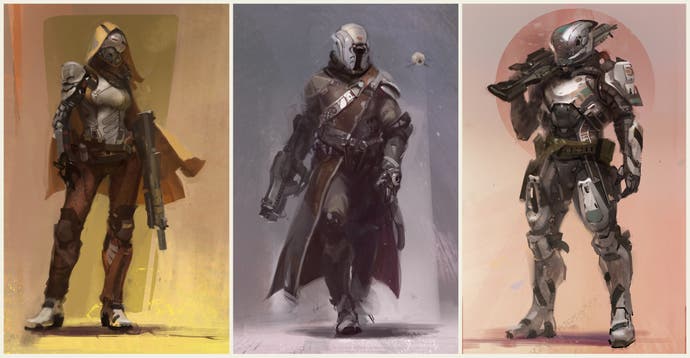
The story: there was a Golden Age long ago when human civilisation occupied the Solar System. This didn't last. At some point a mysterious force almost wiped out humanity, but the Traveller stepped in, making a last stand that saved a precious few. The Traveller's sphere floats above the Earth's last great city, watching, protecting. Now, humanity is creeping out from behind the safety of the city's huge wall only to find aliens have taken root across the Earth, the Moon, Mars, Venus and other areas of the system. And the aliens are attacking the city in an attempt to finish off mankind for good. You play a Guardian charged with defending the city, fighting back against the aliens using weapons powered by the Traveller's advanced technology.
This is a setting Bungie calls "mythic science fiction", a futuristic place with age, history and mystery. The ultimate goal of the game appears to be to grow your Guardian over time, customising it with equipment and weapons won out in the field. Accomplishment will be constant, or, at least, opportunities for accomplishment will be constant.
"Imagine after a hard day at work or at school, when you feel like you've been going backwards, imagine you could go home and spend an hour with an experience where you feel like you accomplish something," Jones says. "That would be awesome, and it's our goal to give players that experience."
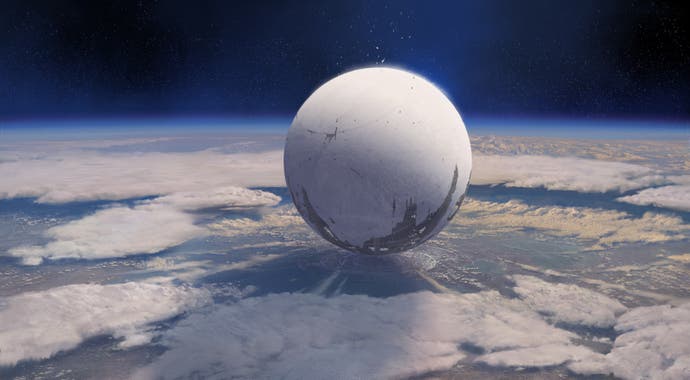
The most intriguing thing about Destiny is how it will be structured. But, unfortunately, Bungie isn't talking about this in detail. We do know Bungie threw away Destiny's main menu entirely in an attempt to come up with a new way for players to tackle activities, although it didn't reveal how this menu-free, new way will work. Jones promises a broad range of activities as well as emergent activities, such as time limited or rare, so players get distracted after they log on and end up doing something different to what they intended. But how, exactly, will they emerge? We don't know.
What's clear is Destiny exists for co-op. "We've always loved co-op at Bungie," Jones says. "Halo 1 was split-screen. But we're making a whole new kind of investment here." There are co-op, competitive, solo, group, casual and intense activities. "Destiny can meet you whatever your mood," Jones says.
Shared experience is Destiny's most important pillar, a design philosophy Bungie truly believes in. Co-op courses through the veins of the game, its heartbeat pulsing constant connections powered by the studio's new, advanced network technology. "Everything you do in life is more fun if you do it with your friends," Jones says. "Everything you do in life is more fun if there are other people around doing the same thing with you. Imagine the gym, imagine college, imagine those experiences were solitary, that there was nobody there, nobody to check you in, nobody working out next to you. It sounds crazy but that's the experience we've had for decades with these solo video game experiences. That's not the kind of campaign we're building in Destiny. That's not what we want to do."
The entire game can be played solo, from start to finish, Bungie confirms, but solo doesn't seem to be the point. Destiny rekindles memories of Gearbox's Borderlands series, but with bigger groups, a bigger world and better technology. Jones mentions in passing six-player co-op activities such as raids, without going into detail. With this in mind, Destiny's always-online requirement makes more sense.
Everything you do in life is more fun if you do it with your friends
Jason Jones

Players love MMOs and open world games more for the emergent gameplay than the gameplay crafted by their designers. They remember the things that happened because players got together and did stuff, whether it be some dramatic boss fight at the end of an hour-long raid or the exploration of a cave discovered off the beaten track. Story lead Joe Staten expects Destiny will work in a similar way, with players building their "personal legend".
He tells a story based on his own character, and it is one that gives us our clearest indication of how Destiny will, structurally, play. Guardians live in one of the towers in the wall that surrounds the city. When not out fighting to reclaim the old worlds, players mill about in the tower's Overwatch District, where other players hang around, much like they do in World of Warcraft's Orgrimmar and Stormwind. Some are gambling for better gear, Staten says. Others are simply admiring the shifting real-time shadows of the day/night cycle. Destiny's fact sheet mentions the city, the social space players will use to refuel, repair, and rearm before going out on their next adventure, will be played in third-person.
Here Staten meets Jason Jones, who plays as a Titan class, described as a "serious, straight up soldier". He's wearing a Vanguard plate. Staten is a Warlock class, a magic user of sorts. Jason greets Joe with an emote and both players head for the hangar. Here we see Jason's space ship, a black scout class built by the Dead Orbit Foundries. Joe paid for his ship by finishing every bounty the Queen of the Reef had to offer. At the press of a button both players are flying up into orbit and outer space.
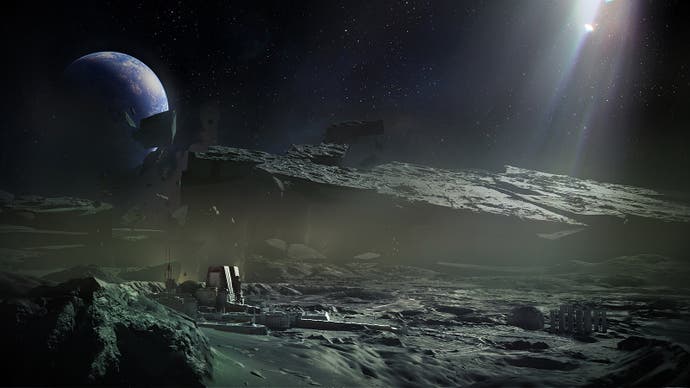
Joe mentions he's already visited the shattered coast of Venus and the Ocean of Storms on the Moon, so today he's heading for Mars, where the bones of a lost human civilisation are buried in sand. Towers hold the precious remains of the Golden Age, but to get them, both players have to fight through a Kabal exclusion zone. The Kabal, one of the game's many alien enemies, are described as big armoured rhinos who drive enormous tanks. A Kabal legion known as the Sand Eaters occupies the buried city. Joe and Jason head for its heart: the Dust Palace.
The pair are holding their own until a Kabal dropship swoops in, firing rockets and dropping off a new squad of Legionaries backed up by a Centurion. It's not looking good. But then a Hunter class Guardian swoops in on a pike to save the day, clad in high-end Dust Walker gear and wielding a pulse rifle. Joe says he's spent enough time researching Destiny weapons on Bungie.net to know the gun the Hunter is carrying is called the Fate of All Fools.
It turns out the Dust Palace is one of Destiny's many public areas, places where you cross paths with other Guardians. Sometimes they're on the same mission as you, following the same story, but most of the time they're on missions of their own. But all are connected by Destiny's under the hood matchmaking.
"Every time this happens, and I run into another player, another real person, it's incredible," Staten says. "I play a lot of shooters and this is not how other shooters operate."
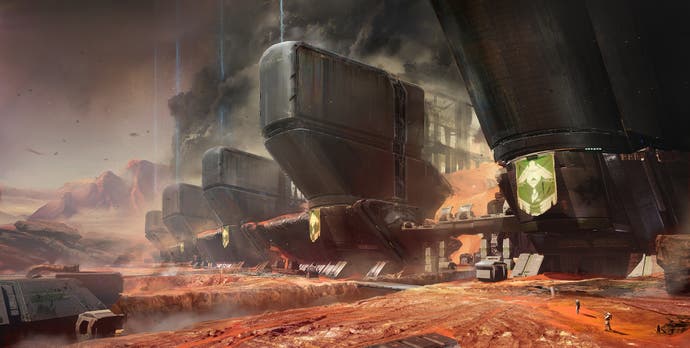
The Hunter points to the entrance of the Dust Palace and strikes a pose that suggests the three should team up. Joe invites her to his group and the players set forth.
The mission is to recover a piece of a machine intelligence built by the ancient powers of Mars. The Kabal fight back but the group makes its way down to the lower level of the Palace and inside a vault. Then, in classic MMO fashion, it's loot time. Jason, the Titan, gets a new shotgun, perfect for close quarters. Joe, the Warlock, finds a rare hand cannon. The Hunter thanks the players for a great run. Joe and Jason thank her for saving them. Then she drives off on her pike into the sunset. Joe and Jason head back into orbit, their virtual space ships packed with the virtual spoils of war.
This story describes a game that, to me, sounds fantastic, a game with all the time-sapping mechanics of World of Warcraft, all the heart-pounding fun and satisfaction of Borderlands' co-op and loot grind, and, of course, the world-class first person-shooting of Bungie's own Halo, all blended together by ground-breaking technology you neither see nor hear. But I am left with many unanswered questions. Is there space combat? Bungie refuses to answer when quizzed, but given the studio dipped its toe into space combat with Halo: Reach, I expect there is.
Will there be loading screens as you leave the city and head out into space? We don't know. How many players can occupy a single public area? Are dungeons instanced, as they are in many MMOs? Can I go into one of these areas and grief other players by kill stealing? How will the game adjust to those who are playing alone and those who are playing together? How big are the open worlds? How does the campaign fit in with the social experience? And what about the player versus player competitor side, for many Bungie fans the most important thing of all? There are many questions and few answers, but this is a good thing. That I desperately want to know more is a good sign.
It seems Destiny will work in familiar ways. There is a shared hub that is safe. There are areas for exploration. There are areas the game will matchmake you with other players without you knowing it. And there are many, many quests and dungeons and the like.
The interesting thing is how Destiny makes all this happen. Bungie promises the game will encourage players to group up and to set out on activities for hundreds of hours over years of time in some seamless, unobtrusive way, powered by a magical matchmaking technology that hums in the background, unseen. Destiny's world will just work, connecting players together using invisible communication towers dotted throughout the solar system. This is what I really want to know more about. This is where Destiny will be truly special. And given Bungie's track record, the studio has my faith.
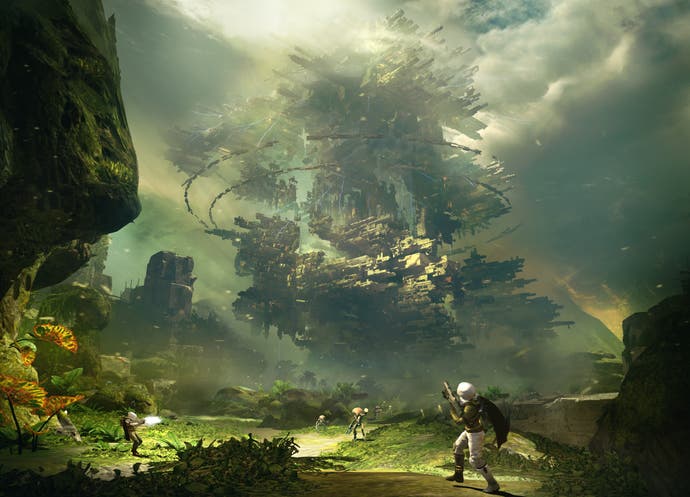
When I think of MMOs I think of the experience of playing, not the story. I would be concerned that Destiny could, perhaps, be lacking in this regard because of its very nature, but because of its nature it has the opportunity to do story differently to any game before it.
Bungie's gargantuan, multi-game 10-year deal with Activision means it's able to spin a yarn packed with complex and multi-threaded story arcs that may not be resolved for years. Bungie thinks of Destiny's story like a series of books, each with a beginning, middle and end that, when put together, form a much larger story with a beginning, middle and end. The setting of each story is the same, but the setting itself may not make sense right away. As all this is explained to me, my mind thinks of J. Michael Straczynski's complex sci-fi space opera Babylon 5.
Having built Destiny we think it's really clear that this is the next step, and in the future all games will be social in this way
Engineering lead Chris Butcher
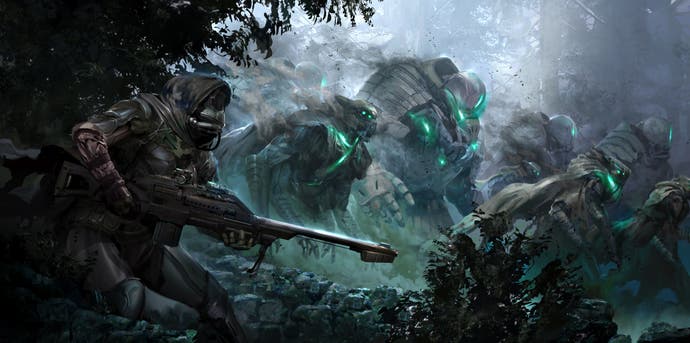
Destiny is a project wrapped in warm irony. With a squint you can see it as Activision's answer to Halo. With a frown you can see it as the Halo killer from the creators of Halo. It seems fate is in on the joke: Halo 4 developer 343 Industries occupies the building Bungie used to inhabit down the road in Kirkland. The address is 343 at 434 Kirkland Avenue, would you believe.
Destiny is also a project that has everything going for it. It is quite possibly the most expensive game ever made, with a budget that would make even 343 jealous and backed by a publisher rich off of two of the biggest games in the world: Call of Duty and Skylanders. It is being made by one of the most talented developers in the world, which has swelled to over 350 people, all of whom are desperate to make the experience as good as possible.
I spent a day inside Bungie, getting a first look at Destiny. These are baby steps, and opinion is formed without the benefit of gameplay footage or hands-on play. But I left excited by the potential Bungie's new universe clearly has. It's a new IP doing new, hugely ambitious things that, while they are not yet fully explained, sound as fantastic as the artwork looks.
Jason Jones takes to the stage to close act one. "I believe we can change again the way people think about shooters. That's certainly what I want to do. That's why I'm here." Roll on act two.
This article is based on a press trip to Bungie's offices in Bellevue, Washington. Activision paid for travel and accommodation.
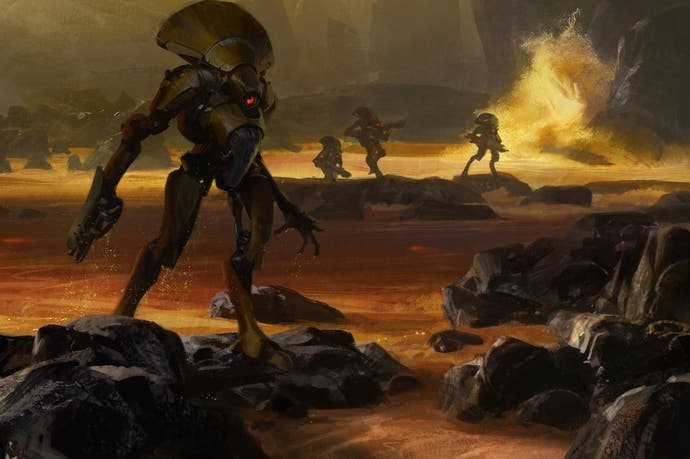





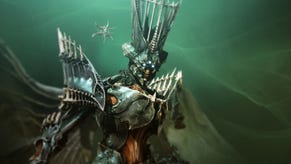
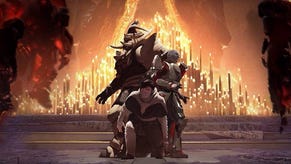


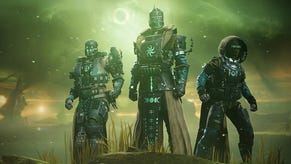



.png?width=291&height=164&fit=crop&quality=80&format=jpg&auto=webp)



